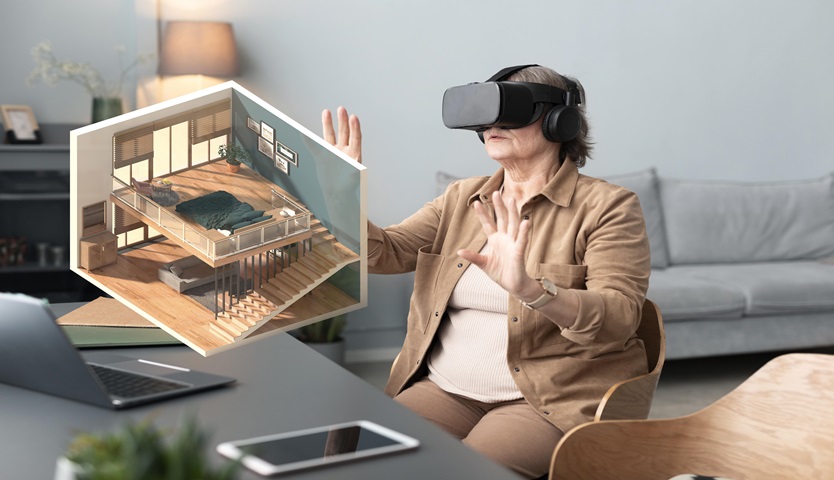Discover how emerging technologies like AI, blockchain, VR, and smart home systems are transforming real estate. Learn about their impacts on buying, selling, and managing properties.
You’re familiar with technology. It’s everywhere – in your home, office, even pocket. But what about real estate? You may not realize how much technology is changing real estate. From virtual tours to smart home control, technology is transforming buying, selling and managing property. This article explores some of the latest, impactful technologies disrupting real estate. You’ll learn cutting-edge tools making the process more efficient, immersive and customized. We’ll also discuss potential downsides and risks from increased digitization. If you’re a homeowner, buyer, real estate professional or interested in tech trends reshaping the industry, keep reading to stay up-to-date on real estate’s high-tech future.
How PropTech Is Disrupting the Real Estate Industry
In recent years, the real estate industry has experienced major disruption from emerging technologies known as “PropTech.” PropTech, refers to any technology used to buy, sell, rent, manage, or finance property. Tech makes the process of renting easy and quick; finding apartments for rent in Alberta is now as easy as just a few clicks on services such as https://gskproperties.ca.
Automated Home Valuations
Homeowners today want an easy way to know what their home is worth. Automated valuation models (AVMs) use public property information, recent nearby home sales, and artificial intelligence to give an instant estimate of a home’s market value. While not as exact as an appraisal, AVMs give buyers a rough idea to see if a home fits in their price range. Virtual real estate helpers handle many regular tasks using AI and automation. They can schedule showings, deal with paperwork, and talk with buyers and sellers using chatbots. Some virtual helpers even use AI to suggest homes that match what a buyer is looking for. While virtual helpers won’t replace human real estate agents, they can take over repetitive jobs so agents can focus on services that involve talking to people.
Virtual Real Estate Agents
AI and automation help virtual real estate representatives with many routine jobs. They can schedule showings, handle paperwork, and talk with buyers and sellers using chatbots. Some virtual agents even use AI to recommend homes that match what a buyer needs. While virtual agents won’t replace human real estate agents, they can take over repetitive tasks so the agents can focus on services that involve personal contact.
Smart Home Technology
Technology that makes homes smart is appealing to both potential homebuyers and renters. If in Alberta, you can find houses for rent in Alberta Canada online on services such as gskproperties.ca. Things like smart thermostats, lights, doorbells and security systems that can be controlled from far away are handy conveniences. As more properties add smart home tech, it influences what buyers expect in a home.
Real estate technology is changing more than just how we buy and sell homes. It’s transforming our expectations for convenience, ease, and connectivity in the places we live. The real estate industry will look very different in the next 10 or 20 years thanks to new technologies. However, in the end, home is where the heart is no matter how advanced it gets.
Key Emerging Real Estate Technologies to Watch
VR and AR
Virtual reality (VR) and augmented reality (AR) are altering how properties are marketed and viewed. VR allows potential buyers to take virtual tours of homes from anywhere using a mobile app. This lets them explore places remotely. AR overlays digital details on the real world through your phone’s camera. So you can see property facts just by pointing your camera. These technologies save time for both buyers and agents. They also provide an immersive experience.
AI and Big Data
Computers are getting better at understanding huge amounts of real estate data. They can see patterns and trends that people miss. Real estate companies use computers to help set good selling prices. They also use them to guess where housing demand will grow in the future. This gives companies an edge over competitors. Homes today often have smart gadgets too. Thermostats, security systems and lights you control with your voice are becoming regular in new homes. Sellers who add these smart devices before listing a home may get a higher selling price. Buyers like homes that have technology features.
Smart Home Tech
Homes today often have smart gadgets too. Thermostats, security systems and lights you control with your voice are becoming regular in new homes. Sellers who add these smart devices before listing a home may get a higher selling price. Buyers like homes that have technology features.
Blockchain
Blockchain is the technology behind cryptocurrencies like Bitcoin, however it also has promising uses for real estate. Blockchain allows several parties to share a secure digital record of transactions. Some new companies are exploring how blockchain can make real estate deals clearer and faster by putting paperwork online and speeding up the closing process. In time, blockchain may completely change how properties are bought, sold, and taken care of.
Conclusion
You never know what’s around the corner when it comes to real estate tech. While all these innovations sound exciting, it’s hard to predict how they’ll shake up the industry long-term. The key is staying nimble and being open to new tools that make your job easier without compromising personal service. At the end of the day, relationships still matter in real estate. But embracing technology thoughtfully could take your business to the next level. Just don’t forget the human touch! With the right balance of cutting-edge tech and old-fashioned people skills, the future looks bright.


